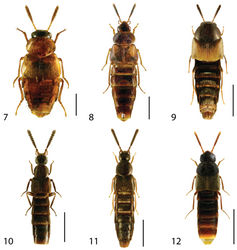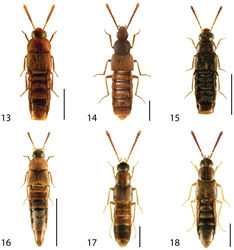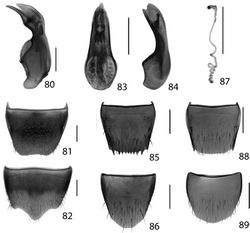Difference between revisions of "Dexiogyia angustiventris"
m (Imported from ZooKeys) |
m (1 revision) |
(No difference)
| |
Latest revision as of 09:43, 26 April 2012
| Notice: | This page is derived from the original publication listed below, whose author(s) should always be credited. Further contributors may edit and improve the content of this page and, consequently, need to be credited as well (see page history). Any assessment of factual correctness requires a careful review of the original article as well as of subsequent contributions.
If you are uncertain whether your planned contribution is correct or not, we suggest that you use the associated discussion page instead of editing the page directly. This page should be cited as follows (rationale):
Citation formats to copy and paste
BibTeX: @article{Brunke2012ZooKeys186, RIS/ Endnote: TY - JOUR Wikipedia/ Citizendium: <ref name="Brunke2012ZooKeys186">{{Citation See also the citation download page at the journal. |
Ordo: Coleoptera
Familia: Staphylinidae
Genus: Dexiogyia
Name
Dexiogyia angustiventris (Casey, 1894) – Wikispecies link – Pensoft Profile
- Thiasophila angustiventris Casey, 1894: 303; 1911: 16. Lectotype (male). Iowa; angustiventris-3, paratype NMNH 39754; Casey bequest 1925; male; our lectotype designation label, present designation (NMNH). Paralectotypes: Iowa; Type NMNH 39754; Casey bequest 192 (NMNH) 1 female [dissected, missing spermatheca]; Iowa; angustiventris-2, paratype NMNH 39754; Casey bequest 1925 (NMNH) 1 female [undissected].
- Thiasophila asperata Casey, 1894: 303 syn. n.. Lectotype (female). California; Thiasophila asperata Casey; Type NMNH 39757; Casey bequest 1925; our lectotype designation label, present designation (NMNH) [dissected].
- Ischnoglossa abscissa Casey, 1911: 16 syn. n.. Holotype (male). Rhode Island (Boston Neck in orig. descr.); male; Ischnoglossa abscissa Casey; Type NMNH 39753, Casey bequest 1925 (NMNH) [dissected].
- Ischnoglossa tenuicauda Casey, 1911: 17 syn. n.. Holotype (male). Florida; male; Ischnoglossa tenuicauda Casey; Type NMNH 39755, Casey bequest 1925 (NMNH) [dissected].
- Ischnoglossa intentaCasey, 1911: 17 syn. n.. Lectotype (male). Iowa, Iowa City, Wickham; intenta Casey; Type NMNH 39756, Casey bequest 1925; our lectotype designation label, present designation (NMNH), [dissected].
- Ischnoglossa alticolaCasey, 1911: 18 syn. n.. Holotype (female). California (Truckee in orig. descr.);alticola Casey;Type NMNH 39758; Casey bequest 1925 (NMNH) [dissected, missing spermatheca].
- Dexiogyia angustiventris (Casey); Seevers 1978[1]: 68 (as ‘anguliventris’). New Canadian Record
Material examined
(Type material – see above). CANADA: ON:Hald.-Norfolk Reg., Cronmiller prop., 6 km W St Williams, site 2, 42°40'18"N, 80°29'24"W, forest, malaise pans, 17.v to 31.v.2011, A. Brunke & S.M. Paiero, 1 (DEBU) same data except: 31.v. to 15.vi; Cronmiller prop., 6 km W St Williams, 42°40'21"N, 80°29'26"W, forest, 5.vii.2011, A. Brunke, 1 (DEBU); Lambton Co.,Pinery Prov. Pk., under white pine bark, 17.iv.2010, A. Brunke, 2 (DEBU).
Distribution
Canada: ON; USA: CA, FL, IA, RI. Native.
Comments
All North American species of Dexiogyia were described by Casey (1894[2], 1911) (as Thiasophila and Ischnoglossa) and differentiated based on slight differences in body proportions, punctation, pubescence and color. An examination of the relevant types revealed no differences between them in their aedeagi or spermathecae and slight differences in external morphology, which were attributed to intraspecific variation. Therefore, Dexiogyia angustiventris was selected as the valid name for this species based on its appearance before Dexiogyia asperata (Casey) in Casey (1894)[2], and Dexiogyia asperata (Casey) syn. n., Dexiogyia abscissa (Casey) syn. n., Dexiogyia tenuicauda (Casey) syn. n., Dexiogyia intenta (Casey) syn. n.and Dexiogyia alticola (Casey) syn. n.are here placed in synonymy with Dexiogyia angustiventris (Casey). To provide nomenclatural stability we have selected and designated lectotypes for Thiasophila angustiventris Casey, Thiasophila asperata Casey and Ischnoglossa intenta Casey. Additionally, one non-type specimen (Iowa, male) of Dexiogyia angustiventris and five non-type specimens in Casey’s collection (NMNH) of Dexiogyia alticola (California, Siskiou Co., 3 females, 1 male, 1 sex?) were examined.
Seevers (1978)[1] noted that the European species Dexiogyia corticina (Erichson) was probably distinct from Dexiogyia angustiventris based on the longer and shaper teeth on male tergite 8 in the latter species. After examination of dissected specimens of Dexiogyia corticina from Leipzig, Saxonia, Germany (ZMB), we consider both as valid but extremely similar species. Dexiogyia corticina may be distinguished from the Nearctic Dexiogyia angustiventris based on the tubus of the median lobe with a ventral swelling in lateral view (straight in Dexiogyia angustiventris (Fig. 84) and the shorter, obtuse teeth of male tergite 8 (Fig. 85).
Dexiogyia has been associated with subcortical microhabitats, especially those of pine and in the ‘burrows of wood-boring beetles’ (Seevers 1978[1]). This is the first record of the genus from Canada and due to its association with pine (Seevers 1978[1]), we suspect this species to be transcontinental in Canada.
Taxon Treatment
- Brunke, A; Klimaszewski, J; Dorval, J; Bourdon, C; Paiero, S; Marshall, S; 2012: New species and distributional records of Aleocharinae (Coleoptera, Staphylinidae) from Ontario, Canada, with a checklist of recorded species ZooKeys, 186: 119-206. doi
Other References
- ↑ 1.0 1.1 1.2 1.3 Seevers C (1978) A generic and tribal revision of the North American Aleocharinae (Coleoptera: Staphylinidae) [with additions and annotations by Lee H. Herman]. Fieldiana: Zoology 71: i-vi, 1–289.
- ↑ 2.0 2.1 Casey T (1894) Coleopterological notices. V. Annals of the New York Academy of Sciences 7: 281–606, pl. 1.
Images
|


